What is holistic nutrition? What does it mean to eat holistic? How do you start living a holistic lifestyle? I'm answering all of these questions and more below.

What is holistic nutrition? It's a natural approach to health that takes an interconnected look at nutrition, lifestyle and environment, to prevent disease and promote good health. At its essence, it encourages you to care for your whole self through a clean diet and positive lifestyle habits.
If that piques your interest, read on. I'm a certified holistic health and nutrition coach, and I'm sharing all the details on how to eat and live holistically below.
Jump to:
- Fast Facts
- What is holistic nutrition?
- Why is holistic nutrition important?
- What does it mean to eat holistic?
- How do you start a holistic lifestyle?
- What do holistic nutritionists do?
- How does holistic nutrition differ from general nutrition?
- 10 simple, tasty holistic recipes
- Printable clean eating grocery list
Fast Facts
- Holistic nutrition explores how dietary habits, lifestyle choices and the environment work together to promote health and prevent disease.
- When we take control of our diet, environment and lifestyle, we can prevent and minimize negative health consequences.
- It is not a replacement for traditional medicine. Instead, it aims to prevent, rather than correct. But, it can also pair with western medicine to treat mind, body and spirit.
- The good news about holistic nutrition is that it's not a restrictive diet. Instead, it's about eating nutrient dense foods that nourish your body and mind.
- Holistic nutrition encourages you to adopt healthy habits for your mind, body and soul.
What is holistic nutrition?
Do me a favour..
Head over to Google and type "how to be healthy" in the search box.
The message is loud and clear from the search results: dietary and lifestyle choices influence our health and the prevention of disease in a major way.
So, what is the role of holistic nutrition in all of this?
First, let me be clear...
- Holistic nutrition is not a diet.
- Holistic nutrition does not overstate the importance of one ingredient or lifestyle.
Instead, it believes that the whole is greater than the sum of its parts.
Holistic nutrition explores how dietary habits, supplement usage, lifestyle choices, the environment, mindset, and spirituality work together to promote health and prevent disease.
When we live a holistic lifestyle, we not only aim to improve our diet, but also our wellness and overall life enjoyment. And, that's what I love about it.
It's not about following fleeting health trends, but instead, taking a back-to-the-basics approach to nourishment and wholesome living.
So, what are some of the hallmarks of holistic nutrition?
- Eating primarily unrefined, unprocessed, organic and seasonal whole foods.
- Understanding the role of supplements, but aiming to get these from food sources whenever possible.
- Promoting positive nutritional habits, like reading and understanding food labels.
- Understanding the relationship between food and the earth, including: farming, soil health, pollutants, toxicity, organic foods, processing and food additives.
- Understanding unique nutritional needs in different life stages.
- Promoting healthy lifestyle habits that nourish your mind and soul (from meditation to exercise to daily affirmations to transformational breathing)

However you look at it, holistic nutrition is about taking a preventative approach to health so you can be the healthiest, happiest version of you.
Why is holistic nutrition important?
Your health is impacted by four main things:
- Genetic and hereditary predispositions
- Diet
- Environment
- Lifestyle
While we can't erase our genetic and hereditary predispositions, we can impact if and how these health conditions play out. When we take control of our diet, environment and lifestyle, we can prevent and minimize negative health consequences.
Fortunately, the world is starting to realize that. More than ever, we're paying attention to our wellness and prioritizing our self-care. We're looking to tweak our diets and lifestyles to ensure our body performs the absolute best it can with the genes we're given.
I for one, love that.
That's what holistic nutrition is all about. It is not a replacement for traditional medicine. Instead, it aims to prevent, rather than correct. But, it can also pair with western medicine to treat mind, body and spirit.
When we address our physical, emotional, mental and spiritual health at once, we're more likely to see positive outcomes. That's because lifestyle and environmental factors - such as stress and loneliness - also lead to negative consequences. The whole truly is greater than the sum of its parts.
What does it mean to eat holistic?
By now you might be wondering, "What can I eat in a holistic diet?".
The good news about holistic nutrition is that it's not a restrictive diet. Instead, it's about eating nutrient dense foods that nourish your body and mind.

So, what exactly does that mean?
For me, eating holistically means fuelling my body with clean food. Here are some principles I live by:
- Eat food as close to its natural state as possible. That means eating primarily whole foods from nature like fruit, vegetables, whole grains, nuts, seeds and legumes.
- Eat a variety of foods. This ensures a better chance at getting all the vitamins, minerals and phytonutrients you need for good health.
- Focus on reducing or eliminating chemical additives where possible. This includes preservatives, artificial colors and flavours, and artificial sweeteners. The best way to do this is to eat primarily homemade (check out my clean recipes here!) and buy from brands you trust.
- Avoid highly processed foods, refined grains, deep fried foods, and added sugars. There's more to a food than the nutrients within it. In fact, the way it is grown, processed and cooked has a huge impact on its nutritional profile.
- Eat locally grown, seasonal whole foods, and organic when it makes sense. Foods that are locally grown during their appropriate seasons are more nutritionally dense. That's because they follow their natural growing and ripening timelines and don't require the use of chemical ripening agents. They're also free from chemical treatments that allow the food to be transported on long journeys.
- Whenever possible, buy meats that are range-fed, as well as free of antibiotics and hormones. Do not consume nitrate or nitrates (primarily found in lunch meats and cured meats).
- Eat mindfully. Eating mindfully means you are aware of why, what, and how you eat. Our emotional state when we eat impacts how a meal is digested, absorbed, and ultimately, impacts our health.
How do you start a holistic lifestyle?
In addition to eating foods that nourish and heal your body, holistic nutrition encourages you to adopt healthy habits for your mind, body and soul.
Illness can be a result of a physical health condition. But, it can also be a consequence of something emotional or psychological. So, the more you focus on improving "the whole you", the more likely you are to feel good. Living a holistic lifestyle is all about looking at the big picture rather than any element within it.
Here's how to be holistically healthy:
- Practice mindfulness
- Nourish positive relationships and build strong connections
- Let yourself grow
- Be and stay active
- Manage stress
- Use holistic remedies to support (like vitamins, minerals, herbs, adaptogens, acupuncture or breathing)
- Use natural, unscented products when possible to minimize harm
- Get quality sleep
- Practice gratitude
- Be conscious of your thoughts and follow therapeutic practices.

What do holistic nutritionists do?
Holistic nutritionists are specialized nutritionists who help patients prevent illness and promote good health through the use of natural foods and remedies, as well as healthy lifestyle recommendations. They seek to understand and treat the "whole" person instead of curing isolated symptoms.
If you want to learn more about holistic nutritionists and how to turn your passion for a holistic lifestyle into a career, check out my post on becoming a Certified Holistic Health and Nutrition Coach.
How does holistic nutrition differ from general nutrition?
To answer this question, I'll highlight the difference between a dietician, nutritionist and holistic nutritionist. While all are considered dietary experts, their education and approaches vary.
Dieticians educate individuals and populations on the use of food to prevent and treat disease. They often work in institutions like hospitals, schools, long-term health facilities and research centres. Because they are strictly regulated, their advice closely follows government guidelines. There is a lot of education required to become a registered dietician, requiring a masters degree in most places.
Unlike dieticians, nutritionists are generally not allowed to diagnose or treat medical conditions. Instead, nutritionists typically work with individuals or populations to educate them about general nutrition and encourage them to make positive food behavior changes. This includes creating and implementing meal plans. In most places, nutritionists require a Bachelors of Science degree.
A certified holistic health practitioner, like a nutritionist, will often work one on one with clients to promote positive health changes. They are more interested in understanding the person as a whole and treating the interaction between diet, lifestyle and environment. While they do make general nutrition recommendations, they also educate on natural approaches to healing the body, like eating organic, using adaptogens, stress management techniques or ayurveda. Practitioners are required to take an extensive certification in holistic nutrition and complete practicum hours before graduating.
Holistic nutrition is not a replacement for general nutrition. In fact, it's not uncommon to see holistic health professionals work alongside registered dieticians, nutritionists and other health practitioners. It's my belief that conventional and alternative medicine should work together to create the happiest, healthiest you.
10 simple, tasty holistic recipes
A holistic approach to nutrition is all about eating clean food that's as close to its natural state as possible for optimum health and wellbeing. And, that's the philosophy I follow when creating recipes for Caitey Jay.
Feel free to check out the recipes I hand selected for you below or peruse my entire recipe collection here.
- Banana Chocolate Protein Muffins
- Air Fryer BBQ Chicken Thighs
- Almond Milk Berry Smoothie
- Extra Crunchy Almond Vanilla Granola
- Healthy Air Fryer Granola
- How To Cook Steel Cut Oats In Instant Pot (+ Overnight Method)
- Sour Apple Smoothie
- Creamy Chocolate Protein Mousse
- Homemade Air Fryer Waffle Fries
- Keto Tartar Sauce
Printable clean eating grocery list
If you're more into creating your own recipes, no problem. I've put together a clean eating grocery list that will help you stock your kitchen with holistic nutrition approved ingredients that make it easy to build healthy, delicious recipes.
So, what is the holistic nutrition definition? It's a health practice that encourages you to look at your health as a whole, caring for your body, mind and soul through healthy diet and lifestyle choices. If you have more questions about holistic health, leave them in the comments below.


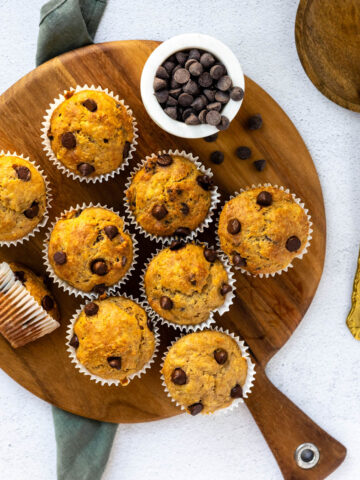
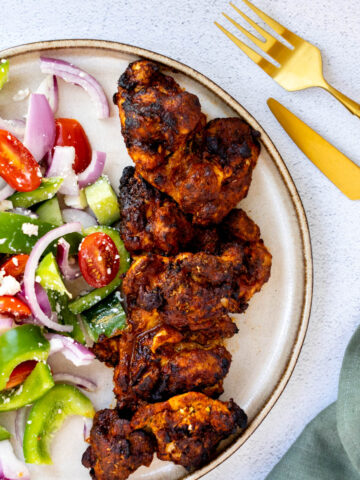
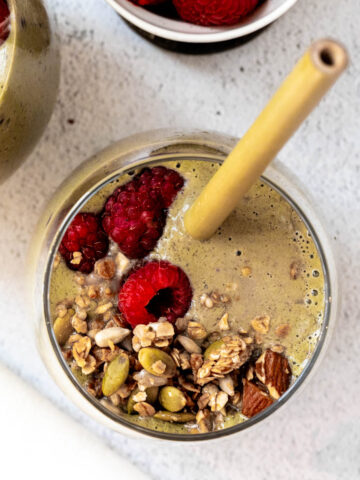
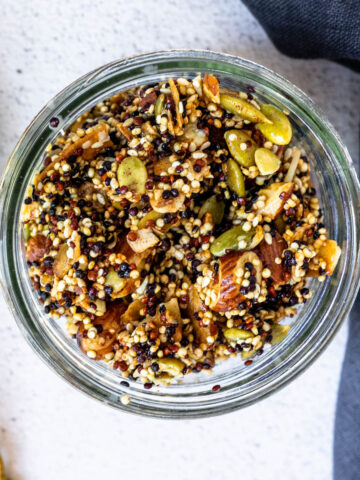
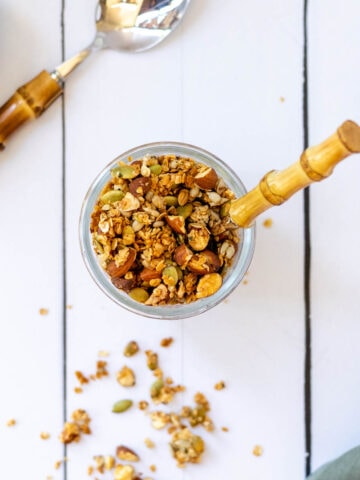
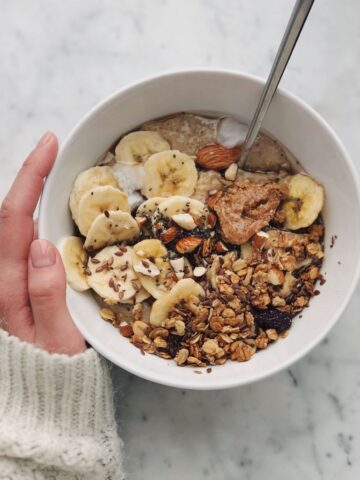
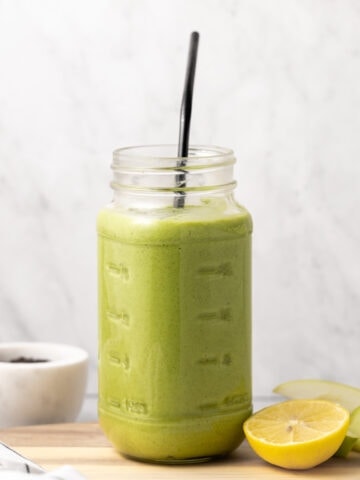
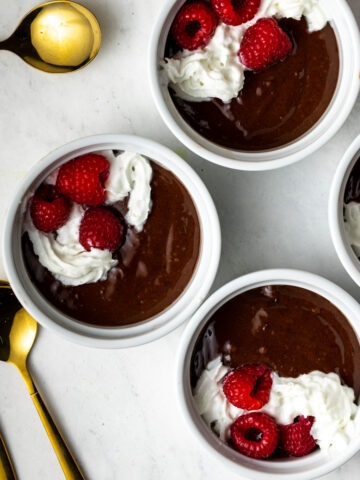
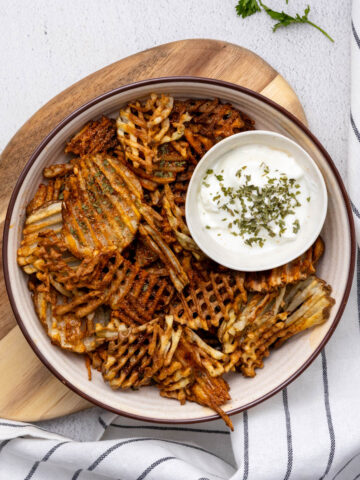
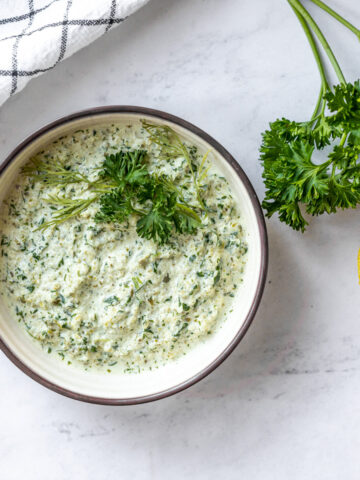

Anonymous
What kind of juicers are the best for nutrient rich green vegetable juices, name a few?